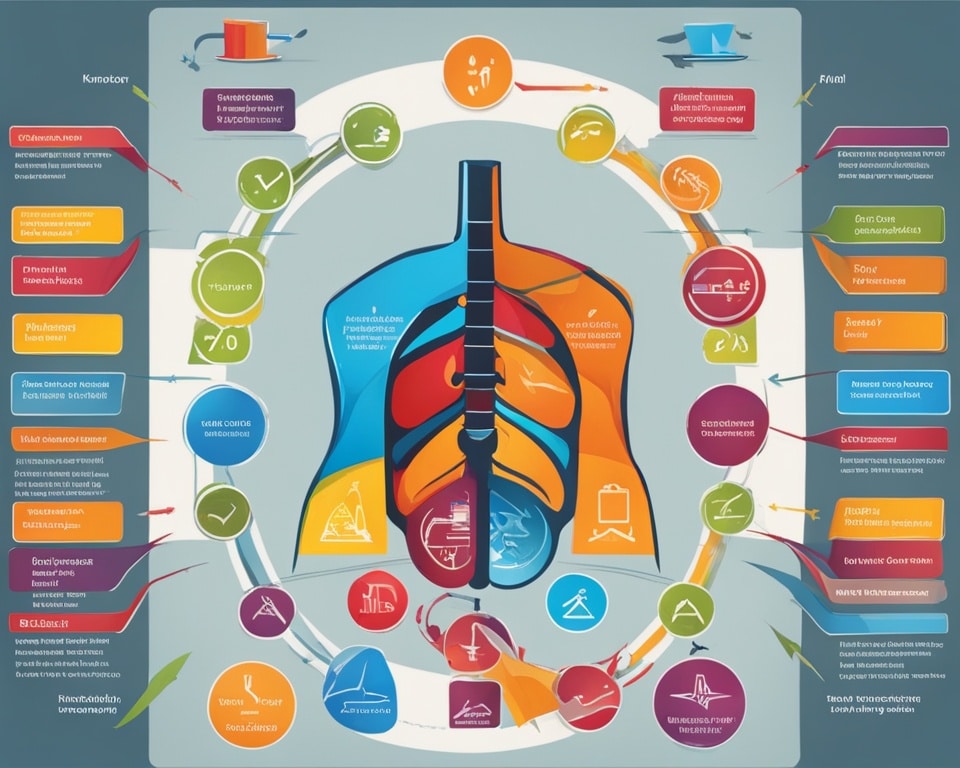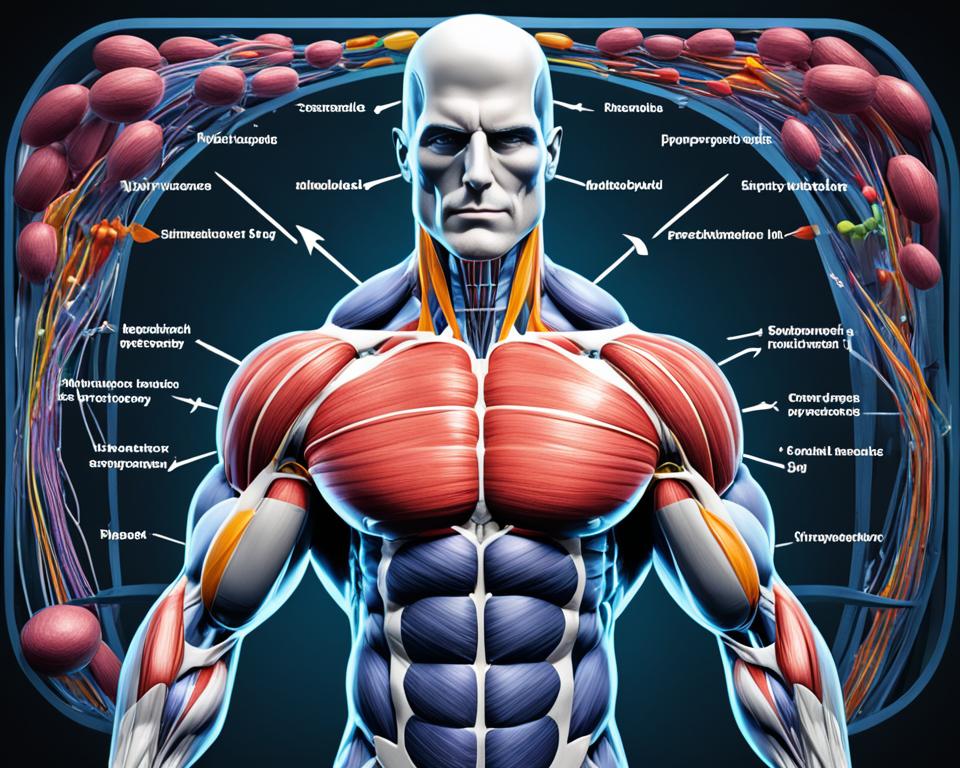
Conquer Your Weight Set Point: Build Muscle Now
Here’s a shocking truth: over 40% of U.S. adults are obese, and that number keeps climbing. But trying to lose weight often feels like an uphill battle. This is because of the set point theory. It says our bodies have a natural weight range, determined by our DNA. This makes losing weight very hard. However, we are not trapped at this set point forever. With the right steps, we can build muscle and change our body’s set weight. This can lead to a healthier life.
We now know that our genes, hormones, and daily habits write the story of our weight. For instance, our fat cells send signals that affect our hunger and metabolism. These signals go to the brain’s hypothalamus, which controls our energy. But, it’s not all out of our control. We can change these signals. Reducing body weight by 10% can convince our bodies to accept a new, healthier weight. While weight loss surgery is an option, building muscle through workouts and eating well is key for weight control.
Key Takeaways
- Understanding the weight set point can empower you to effectively build muscle and manage body weight.
- Actions like enhancing diet quality and incorporating resistance training can shift the body’s weight defenses.
- Seeking support from healthcare providers can provide tailored strategies for long-term healthy weight range success.
- Patience is key: gradual body weight modifications are more sustainable than quick fixes.
- Maintaining a positive approach toward weight management strategies ensures lasting change and a healthier lifestyle.
Understanding the Weight Set Point Theory
When we talk about weight regulation, it’s key to know about the metabolic set point. This idea says our bodies have a natural weight range they like to stay in. It’s important to get this to manage weight today.
What is Weight Set Point?
The set point theory is about the weight our bodies work hard to keep. It acts like an invisible wall to weight loss. This is why losing weight can be so hard, even with diet and exercise.

The Role of Hormones in Weight Regulation
Hormones like ghrelin and leptin are key in weight regulation. Dieting changes these hormones, making us go back to our old weight. It’s a common struggle that can mess up our weight loss efforts.
Genetic Factors Impacting Your Body’s Set Point
Our genes have a big say in our weight’s set point. Obesity has a genetic side to it. These genes decide how our bodies handle fat. This affects our weight and how our bodies look.
| Statistic | Detail |
|---|---|
| Global Obesity Trends (1975-2016) | Obesity prevalence nearly tripled worldwide |
| U.S. Obesity Growth (1999-2018) | Obesity increased from 30.5% to 42.4%; severe obesity from 4.7% to 9.2% |
| Projected U.S. Trends by 2030 | 78% of American adults might be overweight or obese |
| Post-Weight Loss Regain | Over 80% tend to regain weight |
| Dieting Consequences | Increased appetite, preference for high-sugar/fat foods, reduced metabolism |
| Adaptive Thermogenesis | 20 to 25% reduction in energy expenditure after 10% weight loss |
| Genetics’ Role | Significant contributor to weight set point, high heritability in obesity |
| Monogenic Obesity | Gene mutations can change set point, leading to obesity |
| Epigenetic Influences | In utero exposure to environment may cause lifelong weight set point changes |
| Environmental Obesogens | Bisphenols, phthalates, etc., can alter metabolism and set point leading to obesity |
Breaking Through Your Body’s Weight Plateau
As a guide in building muscle, I get the challenge of overcoming weight plateau. It’s when your weight loss efforts suddenly stop showing results. This plateau can be tough but isn’t unbeatable. With the right science and methods, you can move past this and maintain weight stability.
A study highlighted a key point: facing a plateau might need new treatments. This could mean gastric bypass surgery or new medications like semaglutide and tirzepatide. These options show that creative solutions can help continue the weight loss journey.
Let’s talk about hunger increases. The CALERIE study noticed that after losing 2.2 pounds, appetite increases, wanting 83 more calories daily. Our bodies try to get back the lost energy. But, new drugs have shown promise in controlling this hunger.
| Treatment | Calories Cut | Calories Reclaimed per Kg Lost |
|---|---|---|
| Semaglutide | 600-1,300 | 49 |
| Tirzepatide | 830-1,560 | 48 |
| Gastric Bypass Surgery | Approx. 3,600 | 58 |
Losing weight involves reducing more calories as you progress. Dropping 10% of your body weight means cutting 20% more calories. Adjusting your diet and exercises is key. Adding protein helps in keeping muscles during dieting.
A secret technique is to just wait. After hitting a plateau, pausing for one or two months can help. Changing up exercises can also kickstart your weight loss again.
Defeating a weight plateau takes a well-rounded approach. Stay in touch with health experts, try new treatments, and keep fine-tuning your diet and workout. The effort you put into following these science-supported strategies leads to lasting weight loss.
The Science of Metabolic Adaptation and Muscle Growth

In my research on weight set point adjustment, I’ve found that muscle hypertrophy plays a big role in how our body uses energy. This interesting connection shows that the right exercises and eating choices can lead to big changes in calorie burning.
How Resistance Training Alters Metabolism
Using resistance training can really help change your body’s energy metabolism. It’s not just about lifting weights. It’s about transforming how your body works inside. For instance, building muscle through this training increases daily calorie burn since muscle burns more calories than fat.
Besides, resistance training tweaks your body’s hormone levels, making it better at burning fat for energy. This change helps move past the body’s usual hang-ups that prevent losing unwanted pounds. Learning about our body’s set point at Cleveland Clinic is key to managing health and tackling obesity.
Nutrient Timing for Optimal Muscle Synthesis
Talking about nutrient timing, it’s crucial. It’s not just the food, but the timing that counts for muscle hypertrophy. Eating proteins and carbs at the right times boosts muscle repair and growth. This, in turn, helps your body burn energy more effectively, aiding weight set point adjustment.
It’s important to remember that a weight set point can change. Overcoming obesity involves many steps. You can adjust your weight set point by eating a Mediterranean diet, adding strength training, and getting enough rest. These steps lead to effective weight control. Muscle might be heavier than fat, but it means a healthier, fitter you.
Nutritional Strategies for Shifting Your Weight Set Point
Understanding how to maintain body weight is complex. But balanced nutrition is a key ally. Since 1975, global obesity has almost tripled. In the U.S., obesity jumped from 30.5% to 42.4% between 1999-2000 and 2017-2018. Choosing dietary changes, like the Mediterranean diet, can help us fight this crisis.
The Mediterranean diet is packed with plant-based foods, lean proteins, and healthy fats. It’s perfect for good nutrition and helps shift the weight set point. Given that genetics also affect obesity, changing the set point is crucial. With the overweight or obese population possibly reaching 78% by 2030, action is needed now.
Losing just 10% of weight can reduce energy use by 20 to 25%. This shows the need for a smart diet to avoid gaining too much weight. Diet affects our weight long-term through changes in our genes and can be influenced by environmental chemicals. This makes the case for a thoughtful diet undeniable.
Considering these facts, the Mediterranean diet is a shining example of hope. I recommend it not just as a fad but as a long-term lifestyle. It provides essential nutrients and supports dietary changes for a healthy weight. This approach avoids the common issue of regaining weight after dieting.
In our journey of weight management, it’s vital to be informed and make wise choices about food. Our path to health is transformative, adopting a Mediterranean diet for balanced nutrition. It leads us to a healthier future.
Workout Routines That Help in Weight Management
To effectively manage weight, combining exercise types is key. A mix of strength training and cardio works best for health. This balance helps you adjust your body’s weight set point for the better.
Importance of Strength Training
Let’s talk about strength training. It’s not just about getting stronger; it also boosts your metabolism. Adding exercises like weight lifting, Pilates, and kettlebell routines makes your muscles work harder. This activity increases your metabolic rate, leading to fat loss over time.
Including Cardio Without Compromising Muscle Gain
Cardio is crucial too, but it shouldn’t take over your workout plan. It’s great for your heart and endurance. Mix it with strength exercises to prevent losing muscle. For instance, mixing a lively walk or bike ride with your lifting routine can help. This way, you burn fat while keeping your muscles strong.
FAQ
What is Weight Set Point?
The weight set point concept says our bodies keep our weight around a certain number due to hormones, metabolism, and brain signals. It’s believed that our bodies fight to stay at this weight, making losing or gaining weight hard.
What role do hormones play in weight regulation?
Hormones play a big role in controlling our weight. They send messages that affect our hunger, fullness, and how we burn calories. For instance, ghrelin makes us hungry, and leptin tells us we’re full. During dieting, changes in these hormone levels can cause our bodies to try and go back to their weight set point.
How do genetic factors impact my body’s set point?
Our genes affect where and how our bodies store fat, how we use food for energy, and our exercise responses. Because of genetics, some people might find it easier or harder to stay within a certain weight range.
How can I overcome my body’s weight plateau?
Overcoming a weight plateau involves changing your lifestyle. This means adjusting what and how much you eat, exercising differently, and taking care of your sleep and stress. These changes can help you get past a stuck point in your weight.
How does resistance training alter metabolism?
Resistance training builds muscles, which use more energy than fat, even when you’re not active. This means having more muscle from such training can boost the calories your body burns when resting. It can help change your weight set point too.
What is the importance of nutrient timing for optimal muscle synthesis?
Eating the right nutrients at the right times, especially proteins and carbs around workouts, helps muscles recover and grow. This practice can improve your fitness and help your metabolism adapt as your muscle composition changes. Moreover, staying adequately hydrated and getting enough sleep are crucial factors that influence muscle recovery and overall performance. On the other hand, alcohol’s impact on muscle growth should not be overlooked, as excessive consumption can hinder protein synthesis and slow down recovery processes. By focusing on balanced nutrition and mindful lifestyle choices, you can optimize your body’s ability to build strength and adapt effectively to training.
What dietary changes can shift your weight set point?
Changing your weight set point can come from a healthy diet. Eating a mix of proteins, fruits, and veggies is key. Following diets like the Mediterranean diet, without cutting a lot of calories, can gradually help lower your weight set point.
Why is strength training important for weight management?
Strength training is key for keeping a high metabolic rate because it builds and keeps muscle mass. This helps your body burn calories more efficiently and maintain a healthy weight easier.
How can I include cardio without compromising muscle gain?
Balancing cardio with strength exercises lets you keep up your heart health while also growing muscles. Moderate cardio, combined with regular resistance training, supports muscle building and helps adjust your body’s composition set point.



